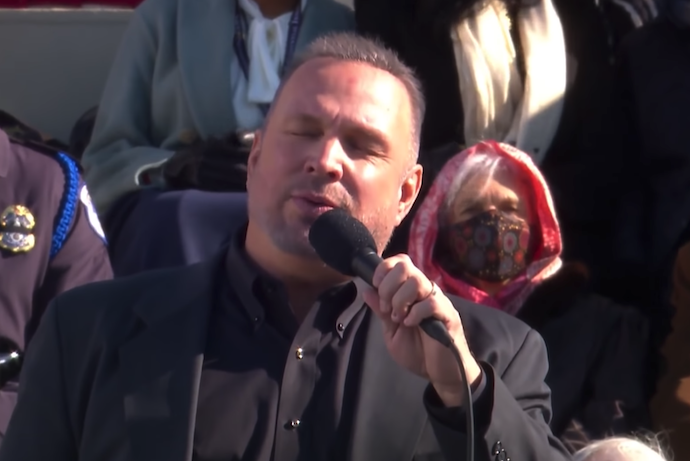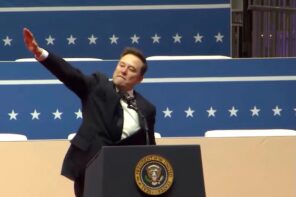There’s a reason religion and politics are forbidden topics in polite conversation: they’re divisive. Mixing the two is doubly so. President Joe Biden is a deeply religious man who turns to his faith in dark times. But 85 million Americans do not. Those nonreligious Americans were left out of yesterday’s moment of national healing.
The inauguration was beautiful. I cried when Supreme Court Justice Sonia Sotomayor, the first Latina on the high court, swore in Vice President Kamala Harris, the first female, first Black and first Asian American to hold such a high office. But religion is divisive and every time the people on that stage turned to the Christian god, or to prayer, or to religion, millions of Americans were left alone, a catch in their throat, a flush in their face, a feeling of exclusion growing with each appeal to the divine. And yes, some of the religious language was intended to be ecumenical or more inclusive than that which might be heard in a church on a Sunday morning, but the religion was impossible to ignore and it wasn’t just nonbelievers left feeling like outsiders in their own country.
There were prayers and hymns. Garth Brooks sang “Amazing Grace,” but those aren’t lyrics non-Christians can sing without feeling, at best, disingenuous. We should not have to set aside our principles and beliefs to participate in the moment of national unity. To ask this is to ask non-Christians to ignore who they are, rather than recognizing that they are just as American as anyone else.
At other times, it was religious rhetoric. When Biden quoted the American Anthem line, “the work and prayers of a century have brought us to this day,” nonbelievers mentally recoiled because to us it’s “the work” that yields progress, not the “prayers.” An inauguration isn’t work or policy, but ceremony and symbolism. So that language matters more, not less. President Biden’s speech was powerful overall, and magnanimous. But also divisive. When it came time to address the pandemic scything across the country leaving 400,000 dead Americans in its wake, what could have been a moment of silence including everyone, Biden instead called for a moment of silent prayer for the believers. It was disappointing. And alienating.
Biden quoted St. Augustine, “a saint in my church,” who thought nonbelievers and non-Christians would be tortured in hell for all eternity, even scorning “tender-hearted Christians” who believed in a less painful or more metaphorical hell. To quote such a person on the beauty or virtue of love cheapens love.
To bring the nation together, both Senator Amy Klobuchar and President Biden quoted the Pledge of Allegiance, declaring that we are “one nation, under God, indivisible,” (as did Jennifer Lopez in Spanish) without realizing that “under God” is an exclusionary amendment to the Pledge from the 1950s and that it is another example, not of unity, but of religion literally dividing “one nation, indivisible,” as the original wording proclaimed.
Even the presidential oath, the text of which is explicitly laid out in the Constitution and which does not include a request for divine assistance, was amended. This “so help me God” tradition is not as old as most Americans think. It dates to WWI and the first 26 presidents didn’t include the phrase when they took the oaths that made them presidents.
The most moving and unifying moment was when the brilliant 22-year-old Amanda Gorman, our nation’s first young poet laureate, performed her poem, “The Hill We Climb.” She grabbed me at the beginning with “we’ve weathered and witnessed a nation that isn’t broken, but simply unfinished” and didn’t let go. She didn’t turn to religion for solace and preaching, but did invoke the Bible for a popular image of peace, “Scripture tells us to envision that everyone shall sit under their own vine and fig tree and no one shall make them afraid.” It felt more like an invocation of Lin-Manuel Miranda’s Hamilton than a holy book.
America survived the Trump administration. Barely. The assault on our Capitol was an assault on our democracy, one we weathered on the back of chance, not the fortitude of our institutions. Christian nationalism played a central role in that assault. Insurrectionists prayed to Jesus on the Senate floor and the Proud Boys halted their march to the Capitol to kneel in prayer. Crosses, Jesus signs, “Jesus is my Savior, Trump is my President” flags, and Bibles were omnipresent in the seditious mob. The religion in the inauguration may seem a far cry from the religion of the insurrection but, as Lincoln put it in his own second inaugural address, “Both read the same Bible, and pray to the same God; and each invokes His aid against the other.” Religion failed to unite the nation then and it continues to divide us to this day.
Christian nationalism will remain an existential threat to the American republic for decades to come. But for now, like Lincoln, we are celebrating a passing danger. A narcissist and would-be tyrant is out of power, and a man who, whatever you think of his politics, at least cares about other people has assumed the most powerful office in the history of the world. We are celebrating the triumph of empathy over cruelty. But while I believe that Biden’s empathy extends to atheists, agnostics, nonreligious Americans, and non-Christian Americans, it did not feel like it today.
We should not make the mistake of thinking that rhetoric about unity will serve to unite us or that prayers for unity will substitute for work. Biden is absolutely correct that “unity is the path forward,” but he must understand that invoking religion necessarily divides Americans into religious camps. Our politicians would gain much and lose nothing by heeding the words Jesus supposedly delivered in the Sermon on the Mount and recounted in Matthew 6:5-6, to not pray in public.
This is not to say that everyone needs to keep their religion to themselves at all times. But ours is a secular government. It was designed that way to ensure religious freedom. There is no freedom of religion without a government that is free from religion. America has no shared faith. To say otherwise, is to say that Americans without a faith are not true Americans.
If America is ever to be unified, our leaders must learn that dividing people along religious lines at moments of national significance is counterproductive. If Joe Biden wants to unite this nation, to knit the sundered American tapestry, he must learn that religion only unites its adherents and excludes everyone else. Today was a missed opportunity. Let’s work together to make tomorrow more inclusive.





